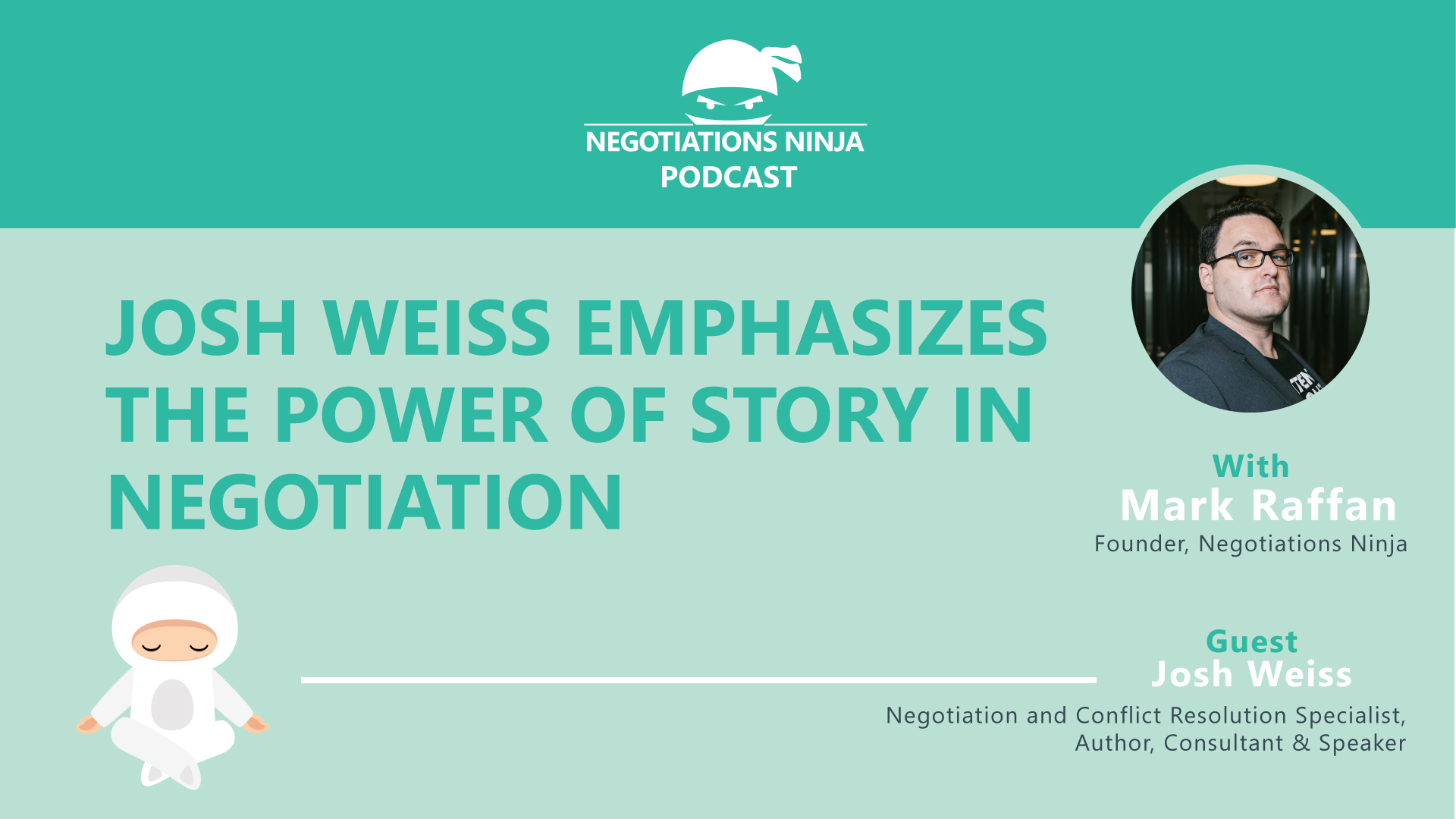Josh Weiss believes very deeply in the power of story. When you tell a story, there isn’t debate because they’re real things that really happened—not just theory. When people are skeptical of negotiation, its value, or its applicability it’s often based more on myth than fact.
So Josh set out to show people what negotiation looks like in real-life in his new book, The Book of Real-World Negotiations. In this episode of the Negotiations Ninja podcast, Josh shares some of the stories that can bring immense value to the negotiation process. Don’t miss it!
Josh co-directs a project with William Ury at Harvard called the Global Negotiation Initiative. He directs Bay Path’s Master of Science in Leadership and Negotiation (which is completely online). Josh is also a negotiation consultant who works with numerous organizations.
Outline of This Episode
- [2:22] Josh Weiss background in negotiation
- [3:24] Josh talks about the power of story
- [7:19] How to make an agreement better
- [15:18] The value of the relationship
- [21:27] Hostage negotiations and onions
- [25:16] Team-based negotiations and deal fatigue
- [27:09] How to connect with Josh
The power of story
When Josh was a kid, Dr. Seuss and Curious George books resonated with him. The lessons of curiosity and thinking differently are embedded in really good stories—yes, even kids’ stories. The power of story and how it penetrates a deeper part of our brain is fascinating. We learn a much deeper lesson when something is told in a story format. It also helps solidify the point in someone’s mind and they’ll remember it longer. Theories are great—but without the story, it makes it far more challenging to remember. The best instructors can relate theory to the real world and demonstrate the practicality of a theory. Because if it’s not applicable, it’s very useless.
How to make any agreement better
Josh points out that people forget that you have the opportunity to optimize an agreement throughout the relationship. You can work to be creative and continually work to maximize the relationship. You simply need to ask the question: Can we explore and see if there’s something that we’ve left out? Is there value to be added? Is there any way to make this better for both parties?
When you already have a deal, asking these questions doesn’t add pressure. You’re not negotiating from a place of being defensive. It only serves to make you think critically about ways to improve the relationship—and that’s when creative solutions happen. It will require strategic decision-making but the amount of value you’ll get out of the extra step will be well worth it.
The value of the relationship
Josh agrees that strong relationships are pivotal to long term agreements. Unfortunately, the prevailing theory is that to meet your short-term needs you have to sacrifice the long-term relationship. Josh points out that’s NOT true. Because if you do that, you engage in self-defeating behavior. If you damage the relationship, there won’t be any further negotiations. He shares: “Relationships—like trust—are very hard to build and easy to break.”
Josh shares a story in which a company was bought out by a larger entity. After the buyout, they realized they were unhappy. So they decided to leave and create another separate business. The bigger company that brought them in threatened to sue them because of concerns that they’d left to become direct competitors. The only thing that prevented the lawsuit from happening was their reaction.
They simply said, there’s a way we can both do this where we don’t compete and instead can collaborate. The relationship they had formed previously opened the door just enough for them to negotiate a way things could work. They started to construct a deal that benefitted them all. They never would’ve gotten that far without the relationship. You are allowed to leverage the relationship when you get into difficult situations. This can allow you to hold at bay really drastic options.
There’s something about breaking bread together that breaks down walls. It harkens back to a time when resources were scarce. Sharing food is sharing life-giving resources. There’s still a part of us that really appreciates that step of trust in a relationship.
Make the negotiation a coffee break
Josh notes that you can use the power of place to deal with conflict. What does that mean? When you can take the formality out of negotiation, it helps to free peoples’ thinking. Offer to take a walk together or meet for lunch instead of meeting in-office. A company Josh consulted for found that they had better results from their conversations during coffee breaks than in the actual negotiation.
So Josh suggested—If the coffee breaks are so valuable—make the whole negotiation coffee breaks. Flip the problem on its head: what is it about the coffee break that makes it work? The informality? A smaller group of people? When you switch to something more informal, people lower their guard. They realize that you’re interested in how to get to an agreement and not trying to trap them or take advantage of the situation.
Resources & People Mentioned
- Howard Raiffa
- Getting to Yes by William Ury
- Getting to Yes with Yourself by William Ury
- Association for Conflict Resolution
Connect with Josh Weiss
Connect With Mark
- Follow Negotiations Ninja on Twitter: @NegotiationPod
- Connect with Mark on LinkedIn
- Follow Negotiations Ninja on LinkedIn
- Connect on Instagram: @NegotiationPod
- negotiations.ninja




